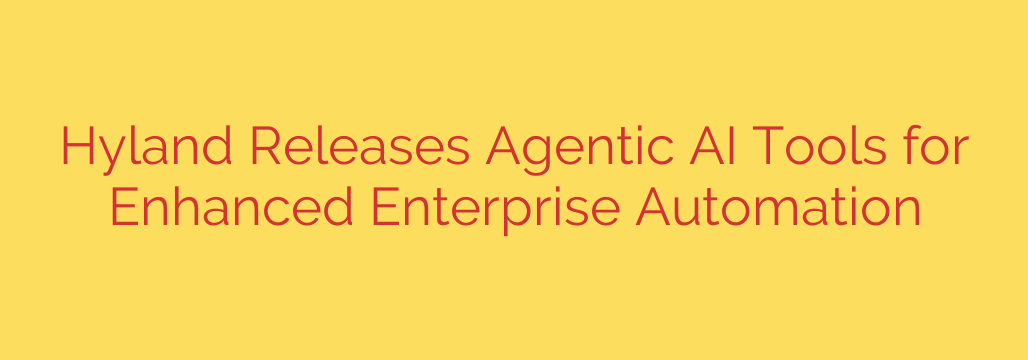
Unlocking True Automation: The Rise of Agentic AI in the Enterprise
For years, businesses have pursued the promise of automation, seeking to streamline workflows, reduce manual effort, and unlock greater efficiency. While traditional artificial intelligence has made significant strides in assisting human workers, a new paradigm is emerging: agentic AI. This transformative technology represents a fundamental shift from AI that merely analyzes and suggests to AI that can autonomously act, plan, and execute complex tasks on behalf of the organization.
Instead of requiring step-by-step instructions, agentic AI systems function as proactive digital team members. They can understand high-level goals, break them down into logical steps, and carry out multi-stage processes from start to finish. This leap forward is set to redefine what’s possible in enterprise automation, moving beyond simple task completion to intelligent, goal-oriented problem-solving.
From Assisting Humans to Acting for Humans
The core difference lies in autonomy. Traditional AI might help a user find a specific contract, but an AI agent can be instructed to “review all contracts expiring in the next 90 days, identify non-standard clauses, summarize the key risks, and flag them for legal review.” The agent doesn’t just find the data; it interacts with it, analyzes it, and initiates the next step in the workflow.
This evolution is being integrated directly into modern content services and process automation platforms, enabling a new class of powerful capabilities designed to tackle long-standing business challenges.
Key advancements being driven by agentic AI include:
- Intelligent Document Processing (IDP): AI agents can now process highly variable and unstructured documents, such as invoices, purchase orders, and legal agreements, without relying on rigid templates. They can independently extract critical information, validate it against other systems, and route it for approval, dramatically reducing manual data entry and errors.
- Proactive Data Governance: One of the biggest drains on productivity and a significant security risk is the accumulation of redundant, obsolete, and trivial (ROT) data. AI agents can be deployed to systematically analyze vast content repositories, identify and classify ROT data, and manage its lifecycle according to company policy, ensuring cleaner, more secure, and more compliant data ecosystems.
- Conversational Information Discovery: The future of search is not about keywords; it’s about answers. Agentic AI powers natural language search that allows users to ask complex questions and receive direct, context-aware answers. An employee can ask, “What were our top sales in the European market for Q2 last year?” and the AI agent will find the relevant reports, synthesize the data, and deliver a concise summary, saving hours of manual research.
The Tangible Benefits of Autonomous AI Agents
Integrating this level of intelligent automation delivers powerful, measurable results across the enterprise. By offloading complex, repetitive, and time-consuming tasks to AI agents, organizations can empower their human workforce to focus on high-value, strategic initiatives.
The primary benefits include:
- Drastically Reduced Manual Effort: Automating end-to-end processes like invoice processing or employee onboarding frees up valuable time and minimizes the potential for human error.
- Enhanced Decision-Making: With AI agents continuously analyzing data and summarizing key insights, leaders have faster access to the accurate information they need to make critical business decisions.
- Improved Security and Compliance: By proactively managing data sprawl and ensuring content is properly classified and retained, agentic AI strengthens an organization’s security posture and simplifies regulatory compliance.
- Accelerated Business Processes: Workflows that once took days or weeks can be completed in a fraction of the time, improving responsiveness to customers and market changes.
How to Prepare Your Organization for Agentic AI
Adopting this advanced technology requires a strategic approach. To harness the full potential of AI agents while maintaining control and security, businesses should consider the following steps:
- Conduct a Data Audit: Before you can automate, you must understand what you have. Begin by identifying where your most critical content resides and assessing its quality. A thorough audit will reveal opportunities for cleanup and highlight the best starting points for automation.
- Identify High-Impact Use Cases: Don’t try to automate everything at once. Pinpoint specific, painful processes that are heavily reliant on manual data handling. Accounts payable, contract management, and HR onboarding are often excellent candidates for initial agentic AI implementation.
- Prioritize Governance and Security Guardrails: Granting AI autonomy requires a strong governance framework. Establish clear rules, access controls, and oversight protocols to ensure AI agents operate within defined boundaries. Treat your AI agents like new digital employees who need clear roles and permissions to function securely.
The era of AI as a passive assistant is drawing to a close. The arrival of agentic AI marks the beginning of true, intelligent automation, where technology acts as a dynamic and proactive partner in achieving business goals. By embracing this evolution, organizations can unlock unprecedented levels of efficiency, intelligence, and competitive advantage.
Source: https://datacenternews.asia/story/hyland-launches-agentic-ai-tools-to-boost-enterprise-automation








